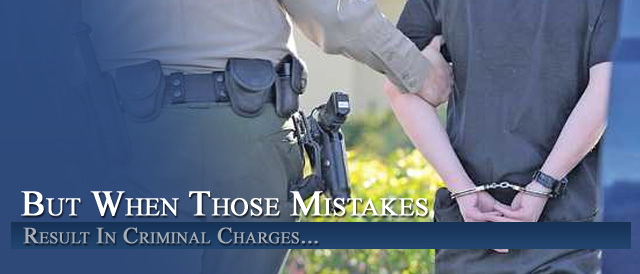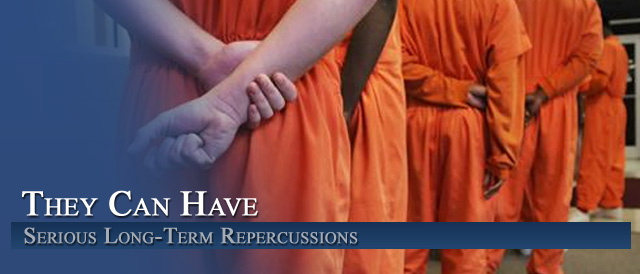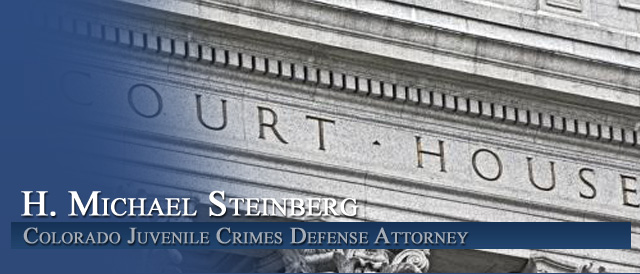




Colorado Juvenile Detention Screening Laws – C.R.S. 19-1-103(94.5), 19-2-212, 19-2-507(2),
H. Michael Steinberg is both an experienced and a dedicated Colorado Juvenile Criminal Defense Attorney
As a former Senior – Career Arapahoe – Douglas County District Attorney -in his13 (1984 – 1997) years as a prosecutor – H. Michael was assigned to the prosecution of hundreds of juvenile prosecutions. As a Colorado Criminal Defense Lawyer for the last 16 years (1997 – 2013) – he has successfully handled hundreds more juvenile cases.
Juvenile criminal defense lawyers must be specialized in this area and must have specialized training and experience to be effective on behalf of their clients… essentially just children. Because Juvenile Court is different than adult court – an experienced lawyer in adult may be incompetent to practice in juvenile court.
Where your child’s freedom and future is at stake…go with experience every time.
Here are the statutes referenced IN THE ARTICLE THAT LINKED you to this page:
Detention Screening – C.R.S. 19-1-103(94.5)
(94.5) “Screening team” means the person or persons designated, pursuant to rule 3.7 of the Colorado rules of juvenile procedure, by the chief judge in each judicial district or, for the second judicial district, the presiding judge of the Denver juvenile court to make recommendations to the juvenile court concerning whether a juvenile taken into temporary custody should be released or admitted to a detention or shelter facility pursuant to section 19-2-508.
Detention Screening – 19-2-212
19-2-212. Working group for criteria for placement of juvenile offenders – establishment of formula – review of criteria.
(1) The executive director of the department of human services and the state court administrator of the judicial department, or any designees of such persons, in consultation with the division of criminal justice of the department of public safety, the office of state planning and budgeting, the Colorado district attorneys council, law enforcement representatives, and representatives of local and county governments, shall form a working group that shall carry out the following duties:
(a) To establish a set of criteria for both detention and commitment for the purposes of determining which juvenile offenders are appropriate for placement in the physical or legal custody of the department of human services. Such criteria shall conform with section 19-2-508. This set of criteria, when adopted by the department of human services and the judicial department, shall be used to promote a more uniform system of determining which juveniles should be placed in the physical custody of the department of human services or in the legal custody of the department of human services so that decisions for such placement of a juvenile are made based upon a uniform set of criteria throughout the state.
In developing such set of criteria, the working group shall utilize any existing risk scale devised by the department of human services or any other measures to determine when it is appropriate to place a juvenile in the physical custody of the department of human services or in the legal custody of the department of human services. In addition, the criteria shall specifically take into account the educational needs of the juvenile and ensure the juvenile’s access to appropriate educational services. The working group established pursuant to this subsection (1) shall hold a meeting once each year to review and propose revision to the criteria established pursuant to this paragraph (a) and the formula created pursuant to paragraph (b) of this subsection (1).
(b) To establish a formula for the purpose of allocating funds by each judicial district in the state of Colorado for alternative services to placing juveniles in the physical custody of the department of human services or in the legal custody of the department of human services. Such allocation shall take into consideration such factors as the population of the judicial district, the incidence of offenses committed by juveniles in such judicial district, and such other factors as deemed appropriate. The working group shall consider and take into account whether any federal moneys or matching funds are available to cover the costs of juveniles within the system, including parent fees and third-party reimbursement as authorized by law or reimbursements under Title IV-E of the federal “Social Security Act”, as amended.
(2) Of the members of the working group established pursuant to subsection (1) of this section, the executive director of the department of human services and the state court administrator of the judicial department, or any designees of such persons, shall have final authority to carry out the duty of creating the set of criteria pursuant to paragraph (a) of subsection (1) of this section and creating the formula pursuant to paragraph (b) of subsection (1) of this section. This authority shall be exercised after working with and participating in the working group process established in this section.
Detention Screening – 19-2-507(2)
19-2-507. Duty of officer – screening teams – notification – release or detention.
(1) When a juvenile is taken into temporary custody and not released pending charges, the officer shall notify the screening team for the judicial district in which the juvenile is taken into custody. The screening team shall notify the juvenile’s parent, guardian, or legal custodian without unnecessary delay and inform him or her that, if the juvenile is placed in detention or a temporary holding facility, all parties have a right to a prompt hearing to determine whether the juvenile is to be detained further. Such notification may be made to a person with whom the juvenile is residing if a parent, guardian, or legal custodian cannot be located. If the screening team is unable to make such notification, it may be made by any law enforcement officer, juvenile probation officer, detention center counselor, or common jailor in whose physical custody the juvenile is placed.
(2) The juvenile shall be detained if the law enforcement officer or the court determines that the juvenile’s immediate welfare or the protection of the community require that the juvenile be detained. In determining whether a juvenile requires detention, the law enforcement officer or the court shall follow criteria for the detention of juvenile offenders which criteria are established in accordance with section 19-2-212.
(3) The juvenile shall be released to the care of such juvenile’s parents or other responsible adult, unless a determination has been made in accordance with subsection (2) of this section that such juvenile’s immediate welfare or the protection of the community requires that such juvenile be detained. The court may make reasonable orders as conditions of said release, which conditions may include participation in a preadjudication service program established pursuant to section 19-2-302. In addition, the court may provide that any violation of such orders shall subject the juvenile to contempt sanctions of the court. The parent or other person to whom the juvenile is released shall be required to sign a written promise, on forms supplied by the court, to bring the juvenile to the court at a time set or to be set by the court. Failure, without good cause, to comply with the promise shall subject the juvenile’s parent or any other person to whom the juvenile is released to contempt sanctions of the court.
(4) (a) Except as provided in paragraph (b) of this subsection (4), a juvenile shall not be detained by law enforcement officials any longer than is reasonably necessary to obtain basic identification information and to contact his or her parents, guardian, or legal custodian.
(b) If he or she is not released as provided in subsection (3) of this section, he or she shall be taken directly to the court or to the place of detention, a temporary holding facility, or a shelter designated by the court without unnecessary delay.
(5) As an alternative to taking a juvenile into temporary custody pursuant to subsections (1), (3), and (4) of this section, a law enforcement officer may, if authorized by the establishment of a policy that permits such service by order of the chief judge of the judicial district or the presiding judge of the Denver juvenile court, which policy is established after consultation between such judge and the district attorney and law enforcement officials in the judicial district, serve a written promise to appear for juvenile proceedings based on any act that would constitute a felony, misdemeanor, or petty offense upon the juvenile and the juvenile’s parent, guardian, or legal custodian. Such promise to appear pursuant to this subsection (5) shall state any charges against the juvenile and the date, time, and place where such juvenile shall be required to answer such charges.
The promise to appear shall be signed by the juvenile. The promise to appear shall be served upon the juvenile’s parent, guardian, or legal custodian by personal service or by certified mail, return receipt requested. The date established for the juvenile and the juvenile’s parent, guardian, or legal custodian to appear shall not be earlier than seven days nor later than thirty days after the promise to appear is served upon both the juvenile and the juvenile’s parent, guardian, or legal custodian.
Other Articles of Interest:
- The Temporary Holding Facility C.R.S. 19-2-507(1)
- The Arrest of Juveniles In Colorado – Colorado Criminal Juvenile Law Part I of II
- Colorado Juvenile Criminal Process – The Detention Hearing And The Screening Function
- Detention (JAIL) C.R.S. 19-2-507
- Birdseye Statutory View – Colorado Juvenile Criminal System












